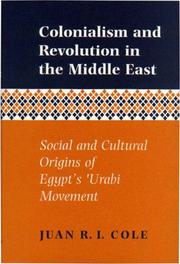| Listing 1 - 2 of 2 |
Sort by
|
Book
ISBN: 0520970365 Year: 2019 Publisher: Berkeley, CA : University of California Press,
Abstract | Keywords | Export | Availability | Bookmark
 Loading...
Loading...Choose an application
- Reference Manager
- EndNote
- RefWorks (Direct export to RefWorks)
Three of the formative revolutions that shook the early twentieth-century world occurred almost simultaneously in regions bordering each other. Though the Russian, Iranian, and Young Turk Revolutions all exploded between 1904 and 1911, they have never been studied through their linkages until now. Roving Revolutionaries probes the interconnected aspects of these three revolutions through the involvement of the Armenian revolutionaries-minorities in all of these empires-whose movements and participation within and across frontiers tell us a great deal about the global transformations that were taking shape. Exploring the geographical and ideological boundary crossings that occurred, Houri Berberian's archivally grounded analysis of the circulation of revolutionaries, ideas, and print tells the story of peoples and ideologies in upheaval and collaborating with each other, and in so doing it illuminates our understanding of revolutions and movements.
Russia --- Turkey --- Iran --- History --- 1904 to 1911. --- 20th century. --- armenian revolutionaries. --- bordering regions. --- collaborating. --- empires. --- frontiers. --- geographical boundaries. --- global transformations. --- ideological boundary. --- interconnected aspects. --- iranian. --- linkages. --- minorities. --- movements. --- peoples and ideologies. --- revolutions. --- russian. --- upheaval. --- young turk revolution.

ISBN: 1282457764 9786612457760 1400820901 1400811279 9781400811274 9781400820900 9780691056838 0691056838 140080132X 1400801338 9781400801329 9781282457768 Year: 1993 Publisher: Princeton, N.J. : Princeton University Press,
Abstract | Keywords | Export | Availability | Bookmark
 Loading...
Loading...Choose an application
- Reference Manager
- EndNote
- RefWorks (Direct export to RefWorks)
In this book Juan R. I. Cole challenges traditional elite-centered conceptions of the conflict that led to the British occupation of Egypt in September 1882. For a year before the British intervened, Egypt's viceregal government and the country's influential European community had been locked in a struggle with the nationalist supporters of General Ahmad al-`Urabi. Although most Western observers still see the `Urabi movement as a "revolt" of junior military officers with only limited support among the Egyptian people, Cole maintains that it was a broadly based social revolution hardly underway when it was cut off by the British. While arguing this fresh point of view, he also proposes a theory of revolutions against informal or neocolonial empires, drawing parallels between Egypt in 1882, the Boxer Rebellion in China, and the Islamic Revolution in modern Iran. In a thorough examination of the changing Egyptian political culture from 1858 through the `Urabi episode, Cole shows how various social strata--urban guilds, the intelligentsia, and village notables--became "revolutionary." Addressing issues raised by such scholars as Barrington Moore and Theda Skocpol, his book combines four complementary approaches: social structure and its socioeconomic context, organization, ideology, and the ways in which unexpected conjunctures of events help drive a revolution.
Social classes --- Class distinction --- Classes, Social --- Rank --- Caste --- Estates (Social orders) --- Social status --- Class consciousness --- Classism --- Social stratification --- History --- ʻUrābī, Aḥmad, --- Egypt --- Aḥmad ʻArābī, --- Aḥmad ʻIrābī, --- Aḥmad ʻUrābī, --- ʻArābī, Aḥmad, --- ʻArabi Pasha, --- ʻIrābī, Aḥmad, --- Ourabi, Ahmad, --- Ourabi, Ahmed, --- ʻUrābī Pasha, --- أحمد عرابي --- عرابي، أحمد، --- عرابي، احمد --- عرابي، احمد، --- عرابى، أحمد، --- History of Africa --- anno 1800-1899 --- Abbasid Caliphate. --- Activism. --- Al-Ahram. --- Al-Mahdi. --- Algerian War. --- Ancien Régime. --- Anti-imperialism. --- Arabization. --- Banditry. --- Before the Revolution. --- Bourgeoisie. --- British Empire. --- Bureaucrat. --- Byzantine Empire. --- Caliphate. --- Capitalism. --- Censorship. --- Central Asia. --- Circassians. --- Colonialism. --- Conspiracy theory. --- Constitutionalist (UK). --- Corporatism. --- Counter-revolutionary. --- Decolonization. --- Despotism. --- Economic interventionism. --- Education in Egypt. --- Egyptian Government. --- Egyptian crisis (2011–14). --- Egyptian law. --- Egyptians. --- Elie Kedourie. --- Emir. --- English Revolution. --- Expansionism. --- Expatriate. --- Extraterritoriality. --- Foreign policy of the United States. --- From Time Immemorial. --- Ideology. --- Imperial Ambitions. --- Imperialism. --- Indian Rebellion of 1857. --- Infant industry. --- Insurgency. --- Intelligentsia. --- International relations. --- Iranian Revolution. --- Jamal ad-Din al-Afghani. --- Jingoism. --- Khedive. --- Labor aristocracy. --- Liberalism (book). --- Liberalism. --- Loan shark. --- Mercantilism. --- Middle East. --- Mirrors for princes. --- Nativism (politics). --- Neocolonialism. --- New Political Economy (journal). --- Newspaper. --- On Revolution. --- Orientalism. --- Ottoman Empire. --- Pan-Islamism. --- Peasant. --- Pogrom. --- Political revolution. --- Politics. --- Poll tax. --- Populism. --- Radicalism (historical). --- Reformism. --- Revolution. --- Revolutionary movement. --- Ruhollah Khomeini. --- Salman Rushdie. --- Sayyid. --- Secularization. --- Social revolution. --- State within a state. --- States and Social Revolutions. --- Subaltern (postcolonialism). --- Suez Canal Company. --- Suez Crisis. --- Tanzimat. --- Tax collector. --- Tax. --- The Imperialism of Free Trade. --- Tyrant. --- Upper Egypt. --- Urban riots. --- Use tax. --- Usury. --- Warfare. --- Westernization. --- Young Turk Revolution. --- Zoroaster. --- Urabi, Ahmad,
| Listing 1 - 2 of 2 |
Sort by
|

 Search
Search Feedback
Feedback About UniCat
About UniCat  Help
Help News
News